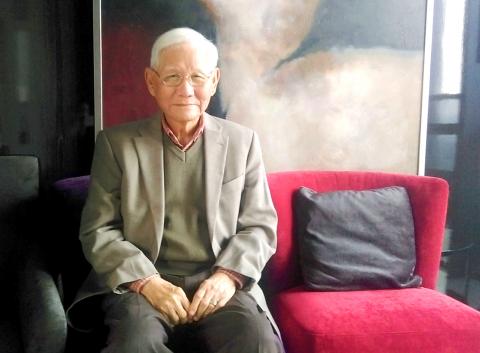Mike Hua (華錫鈞), one of the developers of Taiwan’s Indigenous Defense Fighter (IDF), died on Tuesday at the age of 92, the air force and Aerospace Industrial Development Corp (AIDC) said.
Hua was born in 1925 in Wuxi, China. He was one of the first Republic of China (ROC) pilots to enroll in the US Air Force’s Lockheed U-2 pilot training school and also qualified as a pilot on North American Aviation’s F-86 Sabres.
Hua flew covert reconnaissance missions over Chinese airspace with the ROC Air Force’s 35th Black Cat Squadron.

Photo: CNA
In 1964, he enrolled in Indiana’s Purdue University aeronautical engineering program, where he earned a doctorate.
Hua returned to Taiwan in 1969 to design aircraft for the ROC Air Force, contributing to the development of the AT-3 and the IDF as the head of the Air Force Industrial Development Center, now known as the AIDC.
In 1982, then-president Lee Teng-hui (李登輝) promoted him to the rank of general for his success in designing the IDF.
In his latter years, Hua sponsored domestic military aviation research and development, donating NT$15 million (US$477,981 at the current exchange rate) to National Cheng Kung University in 2012 and establishing the Hua Hsia Chun Aeronautical Engineering Foundation last year.
“Taiwan has sufficient technological know-how to make aeronautics an economic development priority,” Hua said last year at the launch of his namesake foundation, adding that Taiwan should have its own satellite program.
“However, Taiwan’s aeronautical industry is only partially subsidized by the Ministry of National Defense and not by the Ministry of Economic Affairs,” he said, calling on the economics ministry to support the development of an aviation industry.
Minister of National Defense Feng Shih-kuan (馮世寬) on Tuesday said Hua had made major contributions to the nation’s aviation industry, adding that development of military aviation and warships are among President Tsai Ing-wen’s (蔡英文) most important policies.
The AIDC said it would assist Hua’s family with funeral arrangements.

The Chinese military has built landing bridge ships designed to expand its amphibious options for a potential assault on Taiwan, but their combat effectiveness is limited due to their high vulnerability, a defense expert said in an analysis published on Monday. Shen Ming-shih (沈明室), a research fellow at the Institute for National Defense and Security Research, said that the deployment of such vessels as part of the Chinese People’s Liberation Army (PLA) Navy’s East Sea Fleet signals a strong focus on Taiwan. However, the ships are highly vulnerable to precision strikes, which means they could be destroyed before they achieve their intended

The Taiwan Experience Education Program (TEEP) has funded short-term internships in Taiwan for more than 4,500 young people from more than 40 countries since 2015, with the goal of attracting and retaining international talent, the Ministry of Education said yesterday. Fifty-five colleges launched 514 projects this year, including in fields such as semiconductors, artificial intelligence, medicine and biotechnology, green energy, and sustainability, it said. The program provides research and practical internships in Taiwan for two to six months, and offers cultural exchange and networking opportunities, the ministry said. For example, National Formosa University’s Embedded System and Autopilot Laboratory developed two solar-powered drones in

GLOBAL: Although Matsu has limited capacity for large numbers of domestic tourists, it would be a great high-end destination for international travelers, an official said Lienchiang County’s (Matsu) unique landscape and Cold War history give it great potential to be marketed as a destination for international travelers, Tourism Administration Director General Chen Yu-hsiu (陳玉秀) said at the weekend. Tourism officials traveled to the outlying island for the Matsu Biennial, an art festival that started on Friday to celebrate Matsu’s culture, history and landscape. Travelers to Matsu, which lies about 190km northwest of Taipei, must fly or take the state-run New Taima passenger ship. However, flights are often canceled during fog season from April to June. Chen spoke about her vision to promote Matsu as a tourist attraction in

Taipei resident Mu Chu-hua caught some glimpses of China’s mighty military parade on YouTube on Wednesday. As she watched hypersonic missiles roll down Beijing’s Changan Avenue and troops march in lockstep, she did not feel like they posed a threat to Taiwan. Mu, a 69-year-old retiree, said she saw the parade as simply a way for Chinese President Xi Jinping (習近平) to “say thank you to the troops.” “I thought it was quite normal,” she said. “It was very cool.” China’s military parade commemorating the end of World War II was being watched internationally for insights into Beijing’s military advances and its show